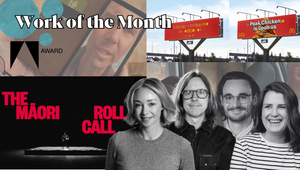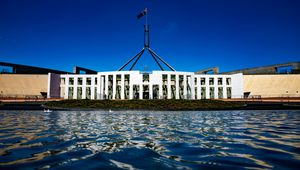
Why Tara Ford Is Looking Beyond the Creative Horizon

“I’ve always known that I was a creative person, as far back as I can remember”, reflects Tara Ford. “But a creative leader? At first, I had a harder time visualising that”.
As LBB invites Accenture Song’s CCO for growth markets to reflect on her early influences, Tara starts from as far back as possible. “I remember my mum strictly limiting TV access – and we didn’t have iPads or phones or any of that”, she says. “So instead, I spent my time with paper and pencils which I loved. If I wasn’t creative, then I’d have been bored!”.
That lack of cultural stimulus beamed in from TV screens had an impact on Tara’s worldview, too. “It meant that I didn’t have the cultural context of certain characters or cartoons, or whatever it may have been, on the school playground”, she recalls. “It wasn’t a big deal, but it did help me realise how important that idea of a shared culture could be at a fairly young age”.
Fast-forward to today, and Tara is precisely the kind of culturally-attuned creative leader that she couldn’t quite visualise as a child. Having joined The Monkeys as chief creative officer back in 2021, last year she took up the CCO role for Accenture Song’s growth markets - namely LATAM and APAC. It’s a new inflection point for Tara that feels natural, a role built on a career that’s been recognised through countless awards from D&AD to the One Show via Spikes, and best-in-class creative work for clients like PlayStation, Nike, McDonalds, ANZ Bank, Virgin, and more. In short, if a kid in 2024 were to attempt to visualise a female creative leader, they’d have an easier time of it than the younger Tara. Because a creative leader looks a lot like Tara Ford.
What’s the Big Idea?
In APAC and LATAM, it’s hard to imagine a bigger – or more diverse – set of markets (“what have I done?!” asks Tara jokingly, as she considers the scale of her newest challenge). But in order to make better sense of it all, the CCO can look back on her own experience of first broadening her creative horizons, when she made the move from Australia to the UK as an ambitious copywriter.
“I felt at the time that London produced the best creative work anywhere on the planet”, she says. “It was a creative powerhouse in the purest, and maybe the most old-school sense. You had a culture where the work made sense for the market that it lived in, but also that had a global relevance and was part of a culture that existed beyond the UK’s borders. That’s a feeling that I really want to emulate”.
That idea of culturally relevant creativity is a motivating one for Tara, and she isn’t shy in identifying it as an ambition for the kind of work she wants to oversee at Accenture Song. It’s no modest challenge – producing work that feels at home in an incredibly nuanced market, while also feeling grand in scale and meaningful across borders. But, helpfully, the DNA of Accenture Song is perfectly suited for the company to rise to that challenge.
“I think there are two things about us which are really powerful in helping us to achieve that goal”, she says. “First is the relationship we foster between creativity and tech. It means that we’re able to build solutions that feel totally out-of-the-box and bespoke for clients. But secondly, and building on that, is our ability to apply creativity to business problems beyond communications. Whether it be e-commerce, experience design, you name it - we have the expertise to apply creativity to any point in a business. That’s our superpower”.
Looking at the headline-grabbing work coming out of Accenture Song in recent times, you can see that superpower being put to work. With ‘The First Digital Nation’, the company tapped into its metaverse expertise to tell a powerful story about the Pacific island nation of Tuvalu’s imperilment from the effects of climate change.
“That’s a great case study of exactly what I’m talking about”, says Tara. “Because we engaged many different parts of our network – an agency alone couldn’t have done that. But we did, because we were able to bring our metaverse and sustainability teams into play”.
She goes on to say that, in a year’s time, the goal is to have one or two more projects of a similar scale to point to in APAC and LATAM. “Ultimately, that kind of creative application is how you avoid stagnation in the marketplace”, she adds. “For a brand, refreshing yourself is the best way to keep people coming back to you – because make no mistake, audiences are constantly searching for something special”.
When LBB suggests that our collective attention spans are getting shorter and, as a result, brands are facing pressure to prioritise quantity of content over quality, Tara bristles. “I’m not sure that I buy that at all”, she says. “Our culture is full of examples of people pouring their attention and focus into things - the kind of work that earns attention is the stuff that wins”.
She explains that, in recent years, her teams have “made a lot of stuff that’s three minutes long or more”, in contrast to the idea that every idea needs to be repackaged into a six-second pre-roll.
“I’m really proud of the work we did for the Sydney Opera House’s 50th anniversary, which we initially wanted to cut down into a smaller piece of content”, she says. “But as the project went on and we saw everything we had, we knew we wanted to share as much of it as possible. The final film is four and a half minutes long, and the reception has been nothing short of phenomenal”.
The film itself - directed by Kim Gehrig with original music and lyrics from Tim Minchin - does a great job of making those four and a half minutes feel like six seconds. It’s a kaleidoscopic, poignant ode to the power of the arts that flashes past in a blur of talent and positivity. But Tara’s broader point is about ideas over content or, in her own words, that our collective attention needs to be earned via the merits of creativity.
And, in LATAM and APAC, it’s hard to imagine a more exciting context in which to test that hypothesis.















